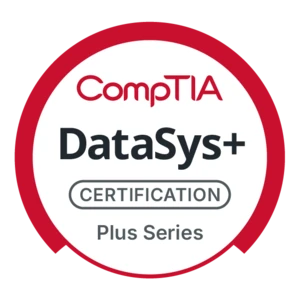Course Overview
CompTIA DataSys+ is a certification designed for professionals with 2–3 years of experience in database administration. It validates the skills needed to deploy, manage, and secure data systems while ensuring business continuity and compliance with industry standards. This vendor-neutral certification equips you with the knowledge to build, support, and maintain databases, implement security best practices, and manage data assets effectively in today’s growing and complex data environments.
Skills Learned
- Understand database structure types and develop, modify, and run SQL code to gather, store, and manage data assets across various operating systems.
- Plan and design databases, implement and test systems, and optimize data deployment processes for effective database deployment.
- Monitor and report on database performance, perform maintenance tasks and create critical documentation to support database management and maintenance.
- Secure databases, protect against attacks, manage authorization, and ensure governance and regulatory compliance to enhance data and database security.
- Prepare for and recover from incidents by implementing disaster recovery, backup, and restoration best practices for database management systems.
Exam Details
- Exam version: V1
- Exam series code: DS0-001
- Launch date: July 18, 2023
- Number of questions: maximum of 90 questions, including multiple-choice and performance-based questions
- Duration: 90 minutes
- Passing score: 700 (on a scale of 100–900)
- Languages: English and Japanese
- Recommended experience: no prerequisites, with 2–3 years of experience in a database administrator role recommended
- NICE and DOD 8140 work roles: database administrator
- Retirement: Usually three years after launch (estimated 2026)
Career Path
Target Audiance
- Software Developer
- Web Developer
- Database Administrator
- Data Engineer
- IT Manager
- IT Project Manager




 4.8
4.8
